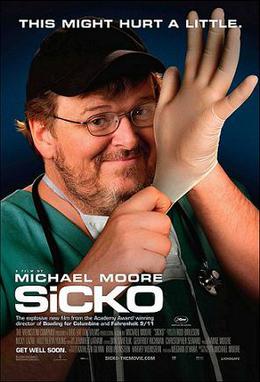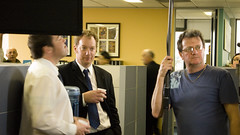The Fujita Scale, or “F-Scale” named after it’s inventor, Ted Fujita who introduced the method to measure the violence of wind storms in 1971, has six le
 Image via Wikipedia
Image via Wikipedia
For comparison, the weakest tornado at F0 leave light damage to the surrounding area, such as branches broken off trees; shallow-rooted trees pushed over; sign boards damaged and so on. While an F5 tornado is nature’s ultimate killing machine, resulting in total damage to anything in it’s path, including houses lifted off foundations and carried great distances, large tractor-trailers and other cars and trucks picked up like toys and flung through the air creating large and extremely dangerous missiles, debris from houses, cars, trees - anything and everything sucked up by the funnel cloud - shredded into a deadly combination of flying woods, metals, glass, and bodies.
 Image via Wikipedia
Image via Wikipedia
The biggest tornados to hit of the six in Canada’s largest province were F2 - which comes clocking in at about 181KM/Hour to 253KM/Hour (about 110 to 250 miles/hour). Classified as causing considerable damage, roofs are ripped off frame houses, large trees snapped or uprooted; light-objects become flying missiles crashing into buildings, cars and people.
The City of Vaughan, just north of Toronto where these two medium-sized twisters struck declared a state of emergency. The province’s premier and Canada’s Prime Minister Stephen Harper both made statements of hope, and promises of help from their respective governments. The media sent their anchors to cover the devastation live, and everyone made a big stink about it.
Though we got off lucky. Not that I have no empathy for those whose homes were smashed, cars crushed, people that were hurt, and the family of the one who lost an 11-year-old son.
But F2 tornadoes are pretty tame compared to some of the massive twisters which have hit far poorer communities in the States. The area the tornadoes did their most damage in Vau
 Image via Wikipedia
Image via Wikipedia
Most people, aren’t so lucky. In the so-called Tornado Alley of America, (from northern Texas, northward through western Oklahoma and Kansas, through eastern Colorado, up through Nebraska, and into southeastern South Dakota, southern Minnesota and western Iowa) much more powerful twisters have ripped through areas of extreme poverty, where those with next to nothing, lose everything.
There have been numerous F5 killer twisters in Tornado Alley - from the first such classified one on May 11, 1953 in Waco, Texas, with 114 lives lost, to March 3, 1966, in Jackson, Mississippi with 57 confirmed deaths, to the more recent F5 tornado on May 3, 1999, at Bridge Creek, in Moore, Oklahoma, with 36 deaths.
The only F5 tornado confirmed in Canada was on June 22, 2007, in Elie, Manitoba, and no lives were lost. Information is scarce from the 1920’s, so the tornado which hid Frobisher, Saskatchewan on July 22, 1920 has never been officially declared an F5, but many believe it to be one. Four people lost their lives in Frobisher’s twister.
Canada’s second deadliest tornado occurred on July 31, 1987 in Edmonton, Alberta, with 27 fatalities, though this tornado was officially classified as a strong F4.
The majority of tornadoes landing in Canada are F1, with the odd F2 and F3. Which is a far cry from the more severe average of F3 and F4 tornadoes to hit the American mid-west’s Tornado Alley.
Tornadoes are dangerous, violent storms, but we Canadians are lucky - we don’t have it as bad as some other places ‘round the globe.
![Reblog this post [with Zemanta]](http://img.zemanta.com/reblog_b.png?x-id=3c7b80ef-a23d-4025-a0c6-ee63ac319636)



![Reblog this post [with Zemanta]](http://img.zemanta.com/reblog_b.png?x-id=efb818ad-6a87-4cde-8048-dd5c0d64e30c)



![Reblog this post [with Zemanta]](http://img.zemanta.com/reblog_b.png?x-id=3c6221dc-f5cc-4f84-bbbb-481407791ead)


![Reblog this post [with Zemanta]](http://img.zemanta.com/reblog_b.png?x-id=44591ffe-3b4c-4d29-baf4-15c78282db84)


![Reblog this post [with Zemanta]](http://img.zemanta.com/reblog_b.png?x-id=8bfffa3c-2cc8-44e8-b151-8778e5739199)



![Reblog this post [with Zemanta]](http://img.zemanta.com/reblog_b.png?x-id=3157568d-c3bc-40fc-b6df-44c606070e01)


![Reblog this post [with Zemanta]](http://img.zemanta.com/reblog_b.png?x-id=bf2726da-eb26-40ba-86ad-b468578238ab)


![Reblog this post [with Zemanta]](http://img.zemanta.com/reblog_b.png?x-id=5dd197d6-2b16-4427-b46e-1d5dca64f512)



![Reblog this post [with Zemanta]](http://img.zemanta.com/reblog_b.png?x-id=e9584032-388e-43c9-8f30-d1fa00f3342d)







